A Person Who Stutters Commitment to Help People Who Stutter in Burkina Faso: A Review of Results and Analysis over 5 Years
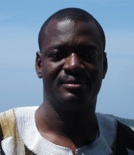 |
About the presenter: Dr. Moussa DAO is a pharmacist who stutters. He lives in Ouagadougou the capital of Burkina Faso. He initiated a stuttering association in his country. He is Board member of the International Stuttering Association. He has presented several papers in different countries through the world. |
A person who stutters commitment to help people who stutter in Burkina Faso: A review of results and analysis over 5 years
by Moussa Dao
from Burkina Faso, West Africa
Introduction
Like most other African countries, Burkina Faso in West Africa confronts several serious health problems, including malaria, meningitis, and aids. These health problems attract significant attention from the government. Stuttering, however, is a debilitating disorder affecting over 160,000 people in Burkina Faso. Nevertheless, stuttering fails to receive the attention it deserves and people who stutter are routinely ostracized by society. While improvements can be seen, people who stutter continue to face serious consequences, including being excluded from society and cultural and social roles. Access to information is limited and professional supports nonexistent.
In order to improve the situation, an association named Action Against Stuttering (ACB) was established in 2002, raising hope for the thousands of people in Burkina Faso to gain access to professional help. Unfortunately there continued to be no speech therapists in the country. In response, a young pharmacist who stutters decided to take up the challenge personally. In addition to his professional work, he decided to meet with people who stutter to help them gain control over their communication. Advising people who stutter essentially became his second profession. Over the last decade, he met with 297 children, adolescents, and adults and their families. This presentation will review the challenges faced, methods used, and progress measured over the last five years.
I Stuttering in Burkina Faso
I-1 Presentation of the country
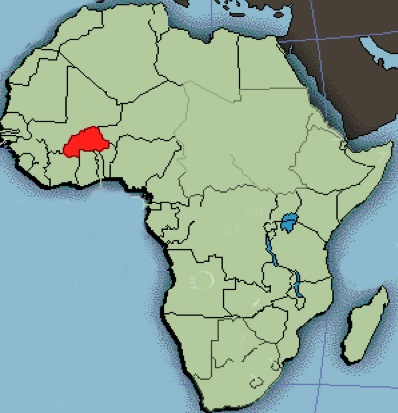
Formerly called Upper Volta, my country changed its name in 1984 to Burkina Faso which means country of people of integrity. The country has 16 million inhabitants. Since it is estimated that there is 1% pws in all population, we can estimate that there is at least 160,000 PWS in Burkina Faso.
Stuttering was forgotten and forsaken by authorities.
It was characterized by:
- Ignorance and fatality
- Absence of treatment centers
- Absence of speech pathologists and training programs in medical schools
- No access to information about stuttering.
- Many PWS obliged to use folk idea as treatments
I-2 ACB
Faced with the above situation, and the bad experiences of pws in Burkina Faso, in 2002 an association called the Burkina Faso Stuttering Association (ACB) was established.
I-3 Our Challenge
The creation of this association raised a great hope. PWS thought that they would now get access to professional help. Unfortunately there were no speech therapists in the entire country.
I-4 How we faced this challenge ?
Besides my professional work as a pharmacist, and also a person who stutters, I decided to take up the challenge of receiving families and PWS in order to try to satisfy their expectation of finding help for stuttering. Becoming an adviser about speech therapy for stuttering became my second "occupation."
I-5 How did I manage my time ?
The PWS were received at my office like the other clients of my pharmacy. During the first 5 years, I was employed at two different pharmacies and sometimes I had to hide my activities related to stuttering from my bosses. Then when I got my own pharmacy, and the number of PWS contacting me increased, I was obliged to dedicate five hours of my Saturday work to my stuttering "clients."
The advisory/consulting sessions were free though, at times some parents insisted on paying. Any money donated was contributed our association's expenses.
I-6 How do I get resources to advise PWS ?
Special thanks to Anne Marie SIMON. I learned so much with her, particularly during the two ISA (International Stuttering Association) missions called the International Speech Project that we conducted in Africa. I learned from her, short advice that can help.
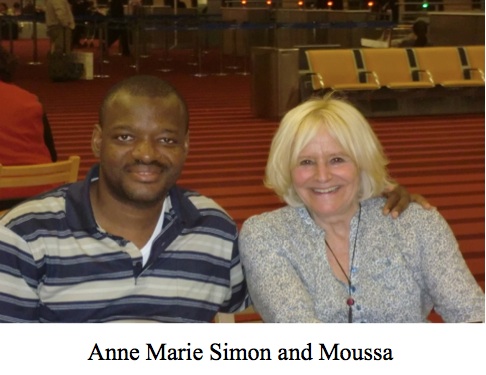
Documents from Stuttering Foundation of America (SFA)
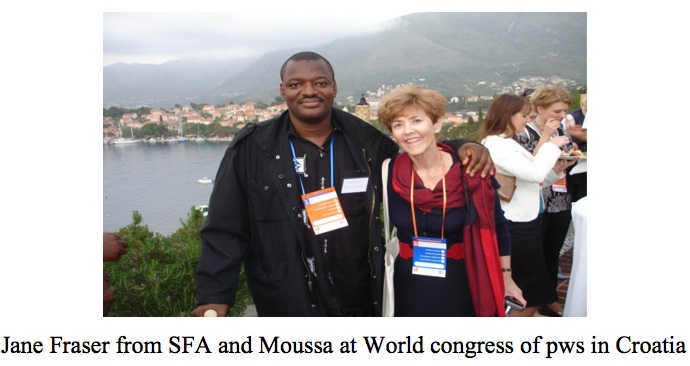
The Stuttering Homepage and ISAD Online conferences by Judy Kuster
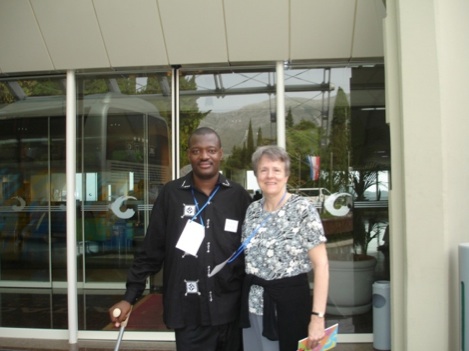
My attendance at Congresses, workshops and what I learned on the Internet. When I discovered there was a lot of information on the Internet about stuttering, I decided I needed to teach myself English. I spoke French!
I- 7 Procedure and mode of Advice
- Case of the Children : - They were generally received alone so that they could easily express themselves. Then I meet with their parents. I talked about their feeling towards their stuttering children and explained what stuttering is and what they can do to help their children.
- Case of the Adolescents and adults: - I gave advice from my own experience. I gave advice from the book of self therapy from the SFA and encouraged them to join our self help groups. I also take their contact information and contact them when SLP students from France come annually or when other specialists have visited Burkina Faso for an extended visit (A.Simon, S. Brigone, Professor David Shapiro, Professor Susan Felsenfeld).
II Analyses of the results
II-1 The clients
From 2002 to 2012 , I have seen 297 PWS and their families. My report below will focus on the past 5 years (2008 to 2012) during which time I saw 183 PWS in my office.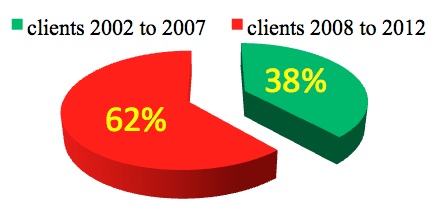
II-2 Gender analysis
Most of the clients were male
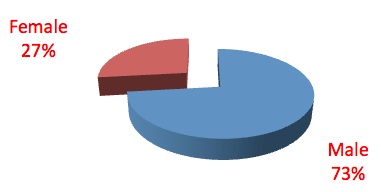
II-3 Age analysis
Most of the clients were children.
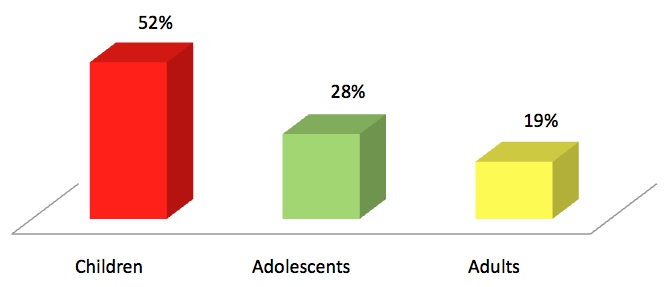
II-4 How the clients heard about me?
The results of explored how people have heard about me, show the impact of my actions. 26 % were referred by the hospitals and 30 % got information during our sensitizing campaigns.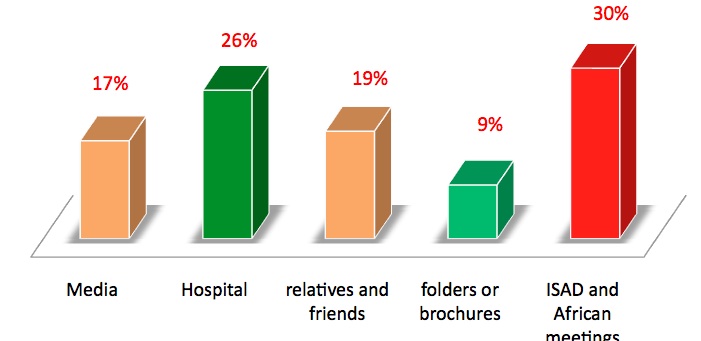
II-5 Where were they from ?
Despite the financial hardship of the population, 19 % of the clients come from other cities of Burkina Faso.
II-6 Other persons that stutter in their families
Over 60 % have PWS among their siblings.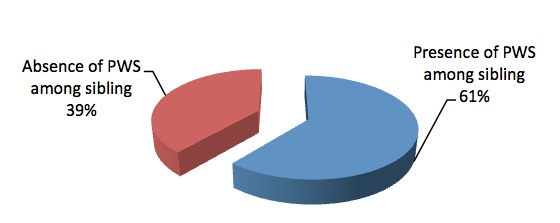
II-7 What treatments they received before coming to meet me ?
79% of the clients had not received any treatment of help prior to seeing me.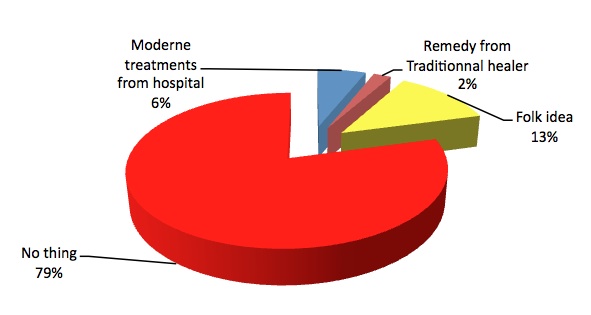
II-8 Is there any follow up of the clients?
Children: The lack of follow up is the main weakness of my intervention. Sometimes I am able go to school and meet with teachers. There is follow-up during one month by French students in the field of speech-language pathology in France.
Adolescents and adults: At times they contact me on the phone. Most of them come back for some specific suggestions to address problems related to presentations at school. I also get feed-back during our Self-help meetings.
Conclusion
For many years, I have been probably been the lone person that can provide any assistance to PWS in my country: It has been a challenging and a wonderful event in my life! I have received positive feed-back by phone or when I meet the parents of several children. One encouraging testimony came from French students : "Moussa, everything we told the patients, most of them said that they already received the same advice from you. Really it seems that we have nothing more to teach them!" There has been progress in getting professional speech therapy in Burkina Faso. Now my work is helped by the presence of 4 speech therapists (2 from Burkina Faso and 2 from France). I am now able to refer the clients to them for follow up.
SUBMITTED: August 16, 2012

